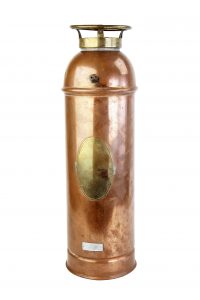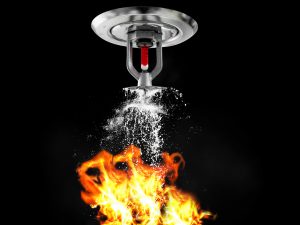Effective Fire Suppression Solutions in Rockland County, NY
Create the right defense at your business when you choose our fire suppression solutions in Rockland County, NY. Campbell Fire Protection Inc. offers fire extinguishers, sprinkler systems, and additional options to help you stay up to code in the Tri-State area. Our products are designed to safeguard your building against different classes of fires. Rely on our fire suppression solutions. We are available for 24/7 emergency service at any time of the day or night.
Fire Extinguishers

As a business, your priority is having properly maintained and inspected fire extinguishers. Since 1937, businesses have relied on us to keep their customers and employees safe. Allow us to advise you on your needs for fire extinguishers, including the type and number required for your business for current codes and regulations.
Our fire extinguisher services include DOT testing. As part of this process, our technicians inspect the fire extinguishers at your location or when you drop them off at our facility. Also, we provide inspection notifications and reminders for your convenience. We contact you via email, phone, or both about upcoming inspections. We also keep track of your system information, so you’ll never miss an inspection.
The National Fire Protection Association (NFPA) provides comprehensive information on NFPA 10 that details requirements to ensure that portable fire extinguishers work as intended to provide the first line of defense against fires of limited size.
Sprinkler Systems

We use vendors who are leaders in the fire sprinkler industry to provide the highest quality parts and materials at the best prices. Our technicians handle all types of sprinkler systems and equipment. We service the full range of water-based fire systems, including:
- Wet Sprinkler Systems
- Dry Sprinkler Systems
- Deluge Sprinkler Systems
- Pre-Action Sprinkler Systems
- Foam Sprinkler Systems
- Fire Pumps
- Antifreeze Loops
- Backflow Preventers
- Fire Hydrants
The NFPA provides comprehensive information on NFPA 25 that is the baseline for inspection, testing, and maintenance of water-based fire protection systems.
Kitchen Suppression Systems
Areas such as kitchens, where fires can occur more frequently, require specialized equipment. We ensure your kitchen fire suppression system is properly maintained, tested, meets all codes and requirements, and, if needed, will work just as it should.
To that end, we are certified distributors for top manufacturers and systems, including Kidde, Buckeye, Pyro-Chem, and Firetrace.
Also, our teams install, maintain, inspect, and repair all types of kitchen fire suppression equipment for all types of kitchens to ensure optimal functionality. This equipment includes:
- Large and Small Kitchen Systems
- Food Truck Kitchen Systems
- UL 300 Systems
- Wet Chemical Systems
- Systems That Meet the UL 300 Standard and Complies with NFPA Standards 96 and 17A
In recent decades, we have performed work on thousands of kitchen system installations. Required inspections for these systems are every six months.
The NFPA provides comprehensive information on NFPA 96 and NFPA 17A, which provide preventive and operative fire safety requirements, intended to reduce the potential fire hazard of both public and private commercial cooking operations.
Emergency Lighting
Business operating codes, fire protection industry requirements, and business insurance policies require that commercial, industrial, institutional, and specific types of residential facilities (i.e., multifamily) have exit and emergency lighting. Facility owners/managers or authorized representatives must conduct monthly inspections and annual tests on all exit and emergency lights, including testing all battery-powered fixtures. Annual, full tests on every battery-powered unit are required.
Our technicians offer full inspections on a monthly or annual basis. Your inspection includes:
- Full Load Test
- Checking for Corrosion
- Adjust Beam Alignment
- Checking Charging System
- Checking Battery Output
- All Required Inspections Monthly and Annually
- Necessary Repairs to Ensure All Exit and Emergency Lighting is in Proper, Working Order
Clean Agent Systems
We use clean agent systems for our clients with businesses that require specialized fire protection systems that will, in the event of a fire, offer the most effective fire suppression and reduction as a more traditional water sprinkler system, without the use of water that can cause damage to precious merchandise or property.
Over our many years in business, we have gained extensive expertise working with a large variety of businesses, so we understand your business may have sensitive conditions, merchandise, or property on-site, such as computer systems. We are experienced in determining what fire protection system is most appropriate for your business. Clean agent systems reduce collateral damage and improve recovery time after a fire. Our technicians are experts with clean agent suppression systems.
Industrial Dry Chemical Systems
In addition to clean agent systems, industrial dry chemical systems are also specialized systems used for businesses with paint, chemicals, or other hazardous materials. We install, maintain, inspect, and repair these systems routinely. Our team handles all types of industrial dry chemical fire suppression equipment, including:
- Paint Spray Booths
- Vehicle Spray Booths
- Gas Stations
- Hazardous Material (HazMat) Storage
The NFPA provides comprehensive information on NFPA 2001 and 17, which is the baseline for inspecting, testing, and maintaining clean-agent and dry chemical fire systems.
Industry Information
Industry associations, including the NFPA, detail comprehensive information on the following:
NFPA 96 and NFPA 17A: Preventive and operative fire safety requirements to reduce potential fire hazards of public and private commercial cooking operations.
NFPA 25: Involves the inspection, testing, and maintenance of water-based fire protection systems.
NFPA 10: Ensures portable fire extinguishers will work as the first line of defense against fires of limited size.
NFPA 2001 and 17: Provides a general sense of the Clean Agent and Dry Chemical systems.
NFPA 101 Life Safety Code: Protects people based on building construction. Protection and occupancy features are used to minimize the effects of fire and related hazards.




